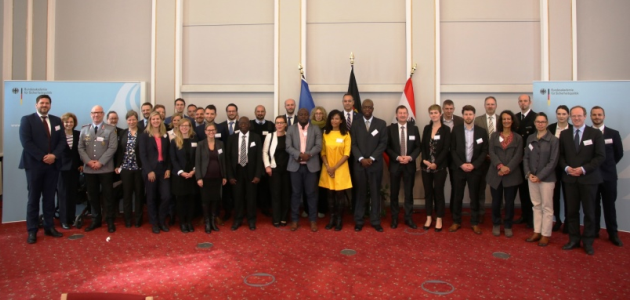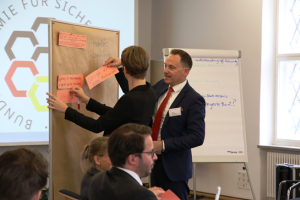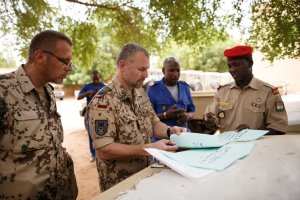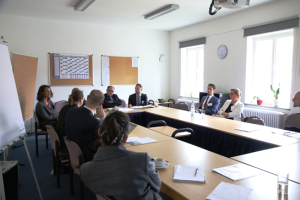In the run-up to a national SSR Strategy, the German Development Agency GIZ and the Federal Academy for Security Policy hosted an international workshop in Berlin on “Security Sector Reform in Fragile Contexts – What Works Best, Where and When?”

The workshop on SSR brought together a wide range of experts from the ministries, development cooperation, security services and civil society as well as SSR experts. Picture: BAKS
“We’re facing serious challenges when it comes to Security Sector Reform” said Dr Jan Grebe, Counsellor for Development Policy at the BAKS, at the beginning of the workshop. Grebe made clear that in crisis-ridden countries like Mali or Iraq, there is critical need for successful reforms of the security sector, abbreviated SSR. Such far-reaching reforms comprise all relevant actors, like the police, judiciary as well as security services. The goal is to provide security according to human rights standards, eventually contributing to peace and stability both on the national and on the regional level.
As a result of the guidelines on “Preventing Crisis, Resolving Conflicts, Building Peace” issued in 2017, the German Federal Government is currently drafting a new SSR strategy for its future engagement in partner countries. That the strategy building process is not at the end of the line yet said Dr Karl-Heinz Kamp, President of BAKS. In his opening remarks, Kamp emphasized the challenges of the SSR strategy process and concluded that this workshop was all the more important for the practice: “There is room for improvement. And we can jointly make a greater impact with partner countries.”
Between formal and informal cooperation

The workshop was designed in an interactive format to allow as much exchange among the participants as possible. Picture: BAKS
“Who is a legitimate security actor or provider?” is a question asked more than ever. Should Germany work together with informal security providers? This was one of the central questions that accompanied the entire workshop. Two prerequisites for cooperation are legitimacy and accountability. This would require criteria, but these cannot be defined as easily as it appears at first. One high-ranking participant argued that the assessment in terms of legitimacy should always be context-specific. “Even ISIL could be a legitimate security provider from the point of view of some people”, he argued. On the other hand, state actors can also be understood as illegitimate - a look at Egypt illustrated this quite clearly, according to one participant. For this reason, too, SSR must always be understood as a political process in which the the “line in the sand” for joint cooperation must be found.
In contrast, another high-ranking participant offered a pessimistic view of informal modes of cooperation: “I think it can't really work”. Although cooperation with informal actors might be a good idea in principle, “strict regulations” simply sometimes did not allow these forms of cooperation. The interaction of statehood and security was therefore still considered the decisive s basis for Germany’s selection of partners. Another participant emphasized that due to the state’s monopoly on the use of force, it is exclusively the state that can provide security legitimately.
Is Interministerial Coordination a dirty word?

The German Federal Government is currently drafting a new SSR strategy for its future engagement in partner countries. Picture: Bundeswehr/Neumann
It became clear that Germany’s interministerial approach, involving for example the foreign office, the ministry of the defense, and the ministry of the interior in SSR, faces great challenges. Although the participants agreed that considerable progress has been made in the recent past, nevertheless, interministerial coordination was still considered difficult in practice. “Coordination is a nice goal, but in practice it is a dirty word", as one participant pointed out. But where does the shoe pinch? One participant described information sharing as a “challenge of time”. That means that in the process of interministerial exchange of information, the main problem is not the lack of capacity of the respective ministries, but rather the time needed for the exchange of information itself. “It simply costs a lot of time”, many participants concluded.
Lack of coherence and flexibility
A high-ranking representative also concluded that the interministerial shortcomings became evident in a lack of coherence and flexibility. Interestingly, incoherence is an issue not only between the ministries but also within the departments themselves. One consequence is that “sometimes everyone fights for himself”, according to a high-ranking participant. At the same time, some ministries also have decisive disadvantages in terms of flexibility compared to other ones. This was made clear by reference to the Ministry of Defence as a Bundestag mandate is always necessary for foreign missions: "We're not that flexible than other ministries.”
Top-down and bottom-up?

One of the main goals was to learn best practices derived from fragile contexts in Africa and elsewhere. Picture: BAKS
Whether the German SSR strategy should be implemented top-down or bottom-up was another point of discussion during the workshop. Surprisingly, there was a broad consensus among the participants to choose a more flexible handling of SSR: “We need a more hybrid approach”, was one participant's demand. The underlying reason given by the participant was that reality could not be divided into the binary logic of top-down or bottom-up, because this would deny the complex facts on the ground. Rather, it was necessary for SSR to be adjusted to the specific national conditions. In this way, it would also be ensured that a “lack of synergies” between national elites and the broader population could be avoided by including more social groups in the SSR process.
The workshop showed an ambitious shift towards engaging into SSR with partner countries; yet it also revealed that there is a lot to do in the future. SSR takes place in volatile, uncertain, complex and ambiguous environments. However, there is a need for clear strategies, identification of relevant actors, inclusive processes, and adaptation of structures to local needs and unforeseen changes. The critical question that remaining is who are the best and legitimate partners, and how to analyze and assess them.
Author: Jonas Jacholke
